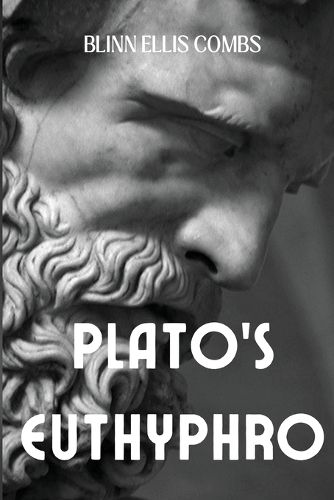Readings Newsletter
Become a Readings Member to make your shopping experience even easier.
Sign in or sign up for free!
You’re not far away from qualifying for FREE standard shipping within Australia
You’ve qualified for FREE standard shipping within Australia
The cart is loading…






This title is printed to order. This book may have been self-published. If so, we cannot guarantee the quality of the content. In the main most books will have gone through the editing process however some may not. We therefore suggest that you be aware of this before ordering this book. If in doubt check either the author or publisher’s details as we are unable to accept any returns unless they are faulty. Please contact us if you have any questions.
This dissertation explores the elenchus, Socrates' method of inquiry and examination, as presented in Plato's definitional dialogues, specifically in the Euthyphro. The work is divided into three parts:
Part One: Theories of the Elenchus
This section provides a foundation for understanding Socrates' method by examining various theories of the elenchus.
Chapter 1: Analyzes the seminal view of Richard Robinson, who is one of the key figures in the study of the elenchus, offering a classical interpretation of Socratic questioning. Chapter 2: Outlines the development and aftermath of Gregory Vlastos' constructivist view, which posits that Socratic questioning is a method of constructing knowledge through a dialogue of conflicting positions. Chapter 3: Focuses on Socrates' own testimony about the elenchus in the Apology, where he defends his method as a divine mission to question and examine the beliefs of others.
These chapters establish a variety of perspectives on the elenchus that provide a foundation for comparing how different interpretations fit with Socratic practice.
Part Two: Commentary on the Euthyphro
The second part shifts to a detailed analysis of the Euthyphro, one of Plato's early dialogues.
The commentary examines how Socrates' method of questioning operates in the Euthyphro and highlights key features of the dialogue. It argues that neither the constructivist nor the non-constructivist accounts of the elenchus presented in the first part fully capture the nature of Socrates' approach in this specific dialogue. The complexity of the Euthyphro suggests that a more nuanced understanding of Socratic questioning is necessary.
Part Three: Technical Destructivism
The final part introduces the author's own interpretation of the Socratic elenchus, termed "technical destructivism."
This view aims to offer a clearer and more accurate solution to several problems that arise when trying to reconcile the various alternative theories of the elenchus. Technical destructivism focuses on the dismantling or deconstruction of interlocutors' definitions and beliefs through a process that is systematic and intellectually rigorous, suggesting that Socrates' method goes beyond mere contradiction to engage in a deeper examination of assumptions and concepts...
$9.00 standard shipping within Australia
FREE standard shipping within Australia for orders over $100.00
Express & International shipping calculated at checkout
This title is printed to order. This book may have been self-published. If so, we cannot guarantee the quality of the content. In the main most books will have gone through the editing process however some may not. We therefore suggest that you be aware of this before ordering this book. If in doubt check either the author or publisher’s details as we are unable to accept any returns unless they are faulty. Please contact us if you have any questions.
This dissertation explores the elenchus, Socrates' method of inquiry and examination, as presented in Plato's definitional dialogues, specifically in the Euthyphro. The work is divided into three parts:
Part One: Theories of the Elenchus
This section provides a foundation for understanding Socrates' method by examining various theories of the elenchus.
Chapter 1: Analyzes the seminal view of Richard Robinson, who is one of the key figures in the study of the elenchus, offering a classical interpretation of Socratic questioning. Chapter 2: Outlines the development and aftermath of Gregory Vlastos' constructivist view, which posits that Socratic questioning is a method of constructing knowledge through a dialogue of conflicting positions. Chapter 3: Focuses on Socrates' own testimony about the elenchus in the Apology, where he defends his method as a divine mission to question and examine the beliefs of others.
These chapters establish a variety of perspectives on the elenchus that provide a foundation for comparing how different interpretations fit with Socratic practice.
Part Two: Commentary on the Euthyphro
The second part shifts to a detailed analysis of the Euthyphro, one of Plato's early dialogues.
The commentary examines how Socrates' method of questioning operates in the Euthyphro and highlights key features of the dialogue. It argues that neither the constructivist nor the non-constructivist accounts of the elenchus presented in the first part fully capture the nature of Socrates' approach in this specific dialogue. The complexity of the Euthyphro suggests that a more nuanced understanding of Socratic questioning is necessary.
Part Three: Technical Destructivism
The final part introduces the author's own interpretation of the Socratic elenchus, termed "technical destructivism."
This view aims to offer a clearer and more accurate solution to several problems that arise when trying to reconcile the various alternative theories of the elenchus. Technical destructivism focuses on the dismantling or deconstruction of interlocutors' definitions and beliefs through a process that is systematic and intellectually rigorous, suggesting that Socrates' method goes beyond mere contradiction to engage in a deeper examination of assumptions and concepts...